System comparison
| |
This is about basic comparison and features of messengersystems as well as supplementary information.
This is something different than function comparisons of messenger apps/programs! There are many such comparisons of individual messengers, where functions are compared and partly also (often subjectively) evaluated. For the (actually) unique “overview of comparisons” go >> here <<.
Quick reference
This concise page answers questions such as:
- Is there a dependency on one vendor?
- Which system has freely viewable source code and which has a corporate secret?
- Is that the same for the software used by users (e.g. “messenger app”) and the server software or not?
- What is the network structure and is one independent here as a user?
- Is the possibility of end-to-end encryption available?
The quick overview is optimized so that it remains readable and meaningful even when viewed and printed in black and white (PDF files approx. 0.5 MB):
 German (PDF) German (PDF) | 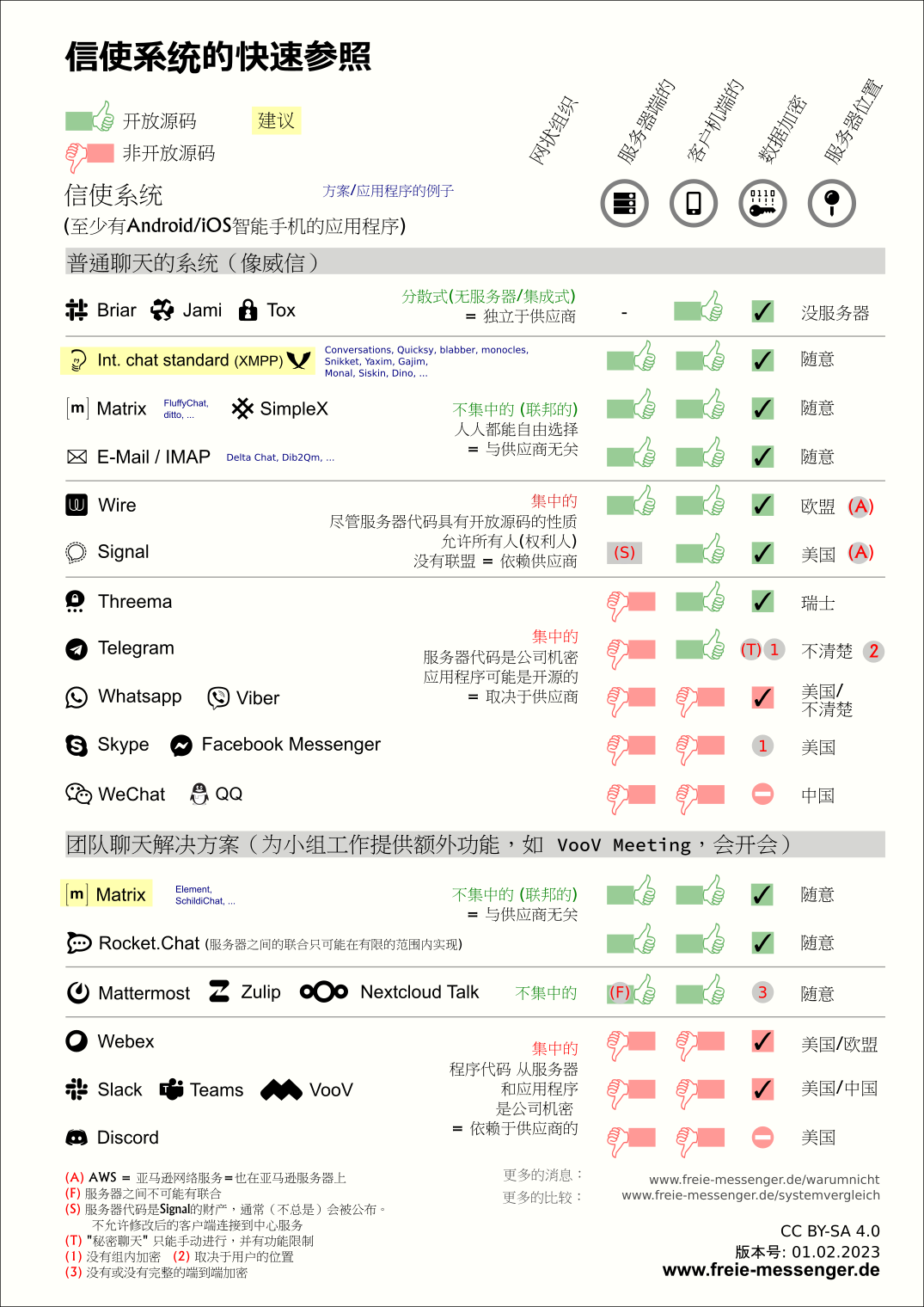 Chinese (PDF) Chinese (PDF) (simplified/shorthand) | 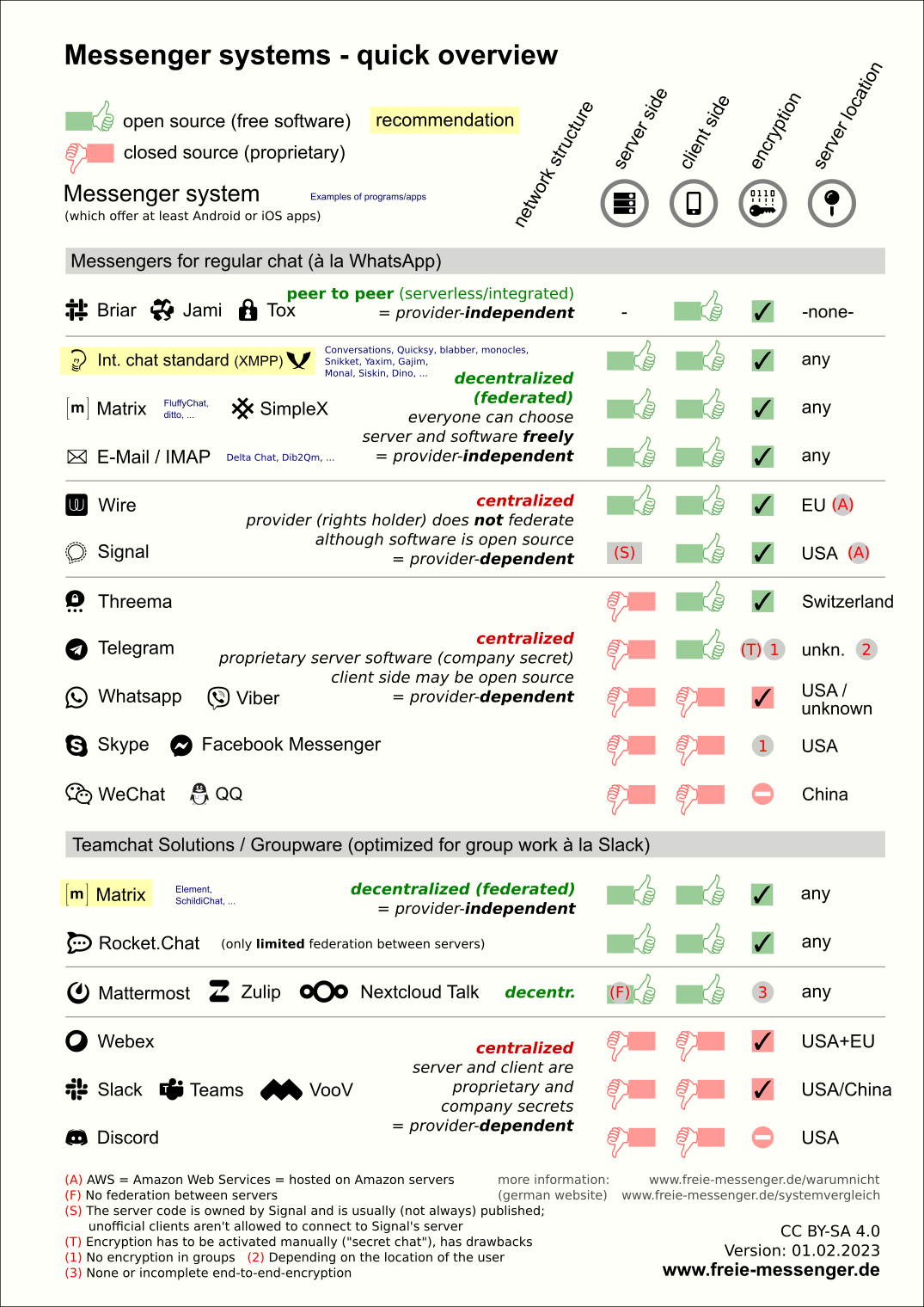 English (PDF) English (PDF)
| 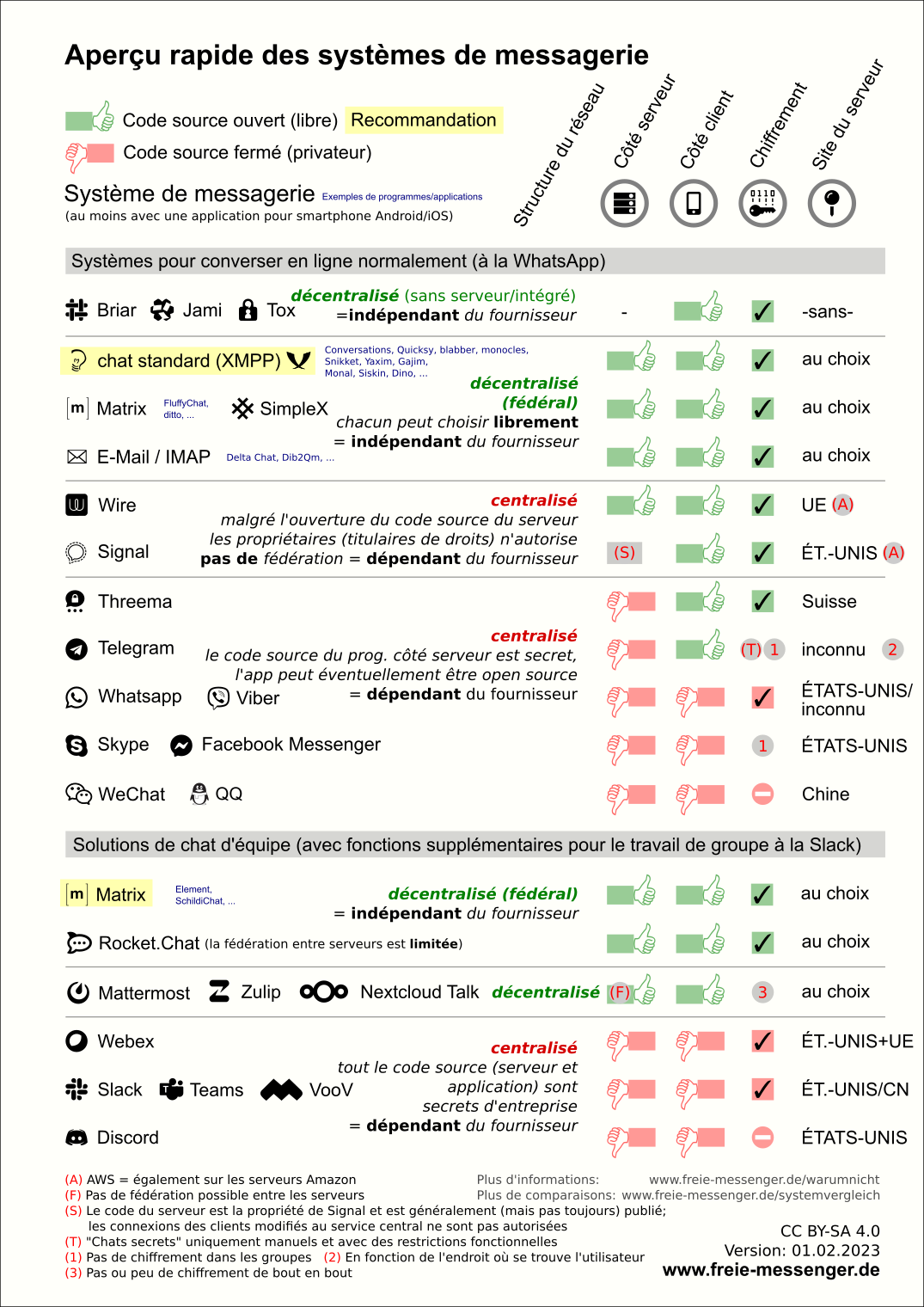 French (PDF) French (PDF)
|  Hindi (PDF) Hindi (PDF)
|
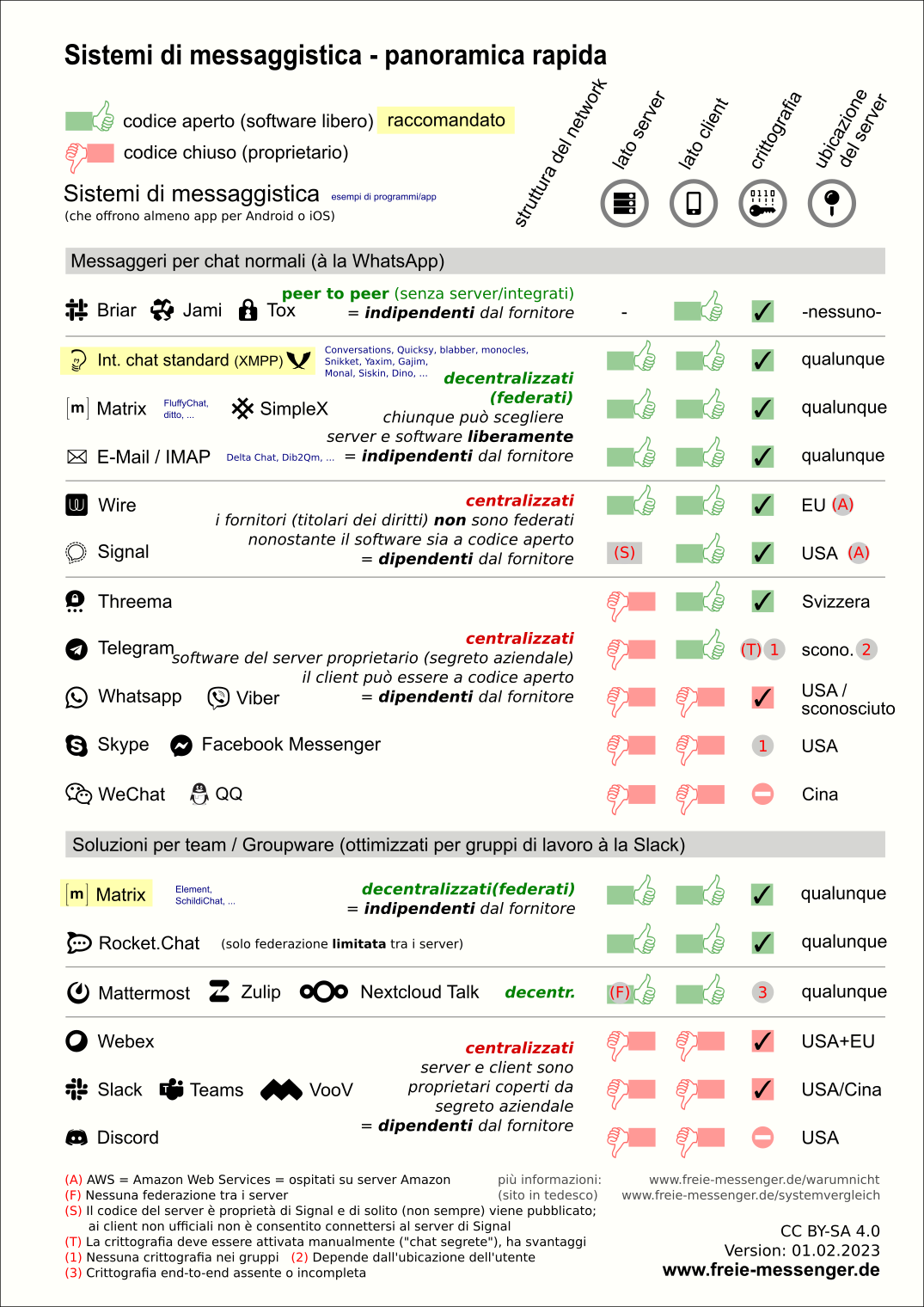 Italian (PDF) Italian (PDF)
| 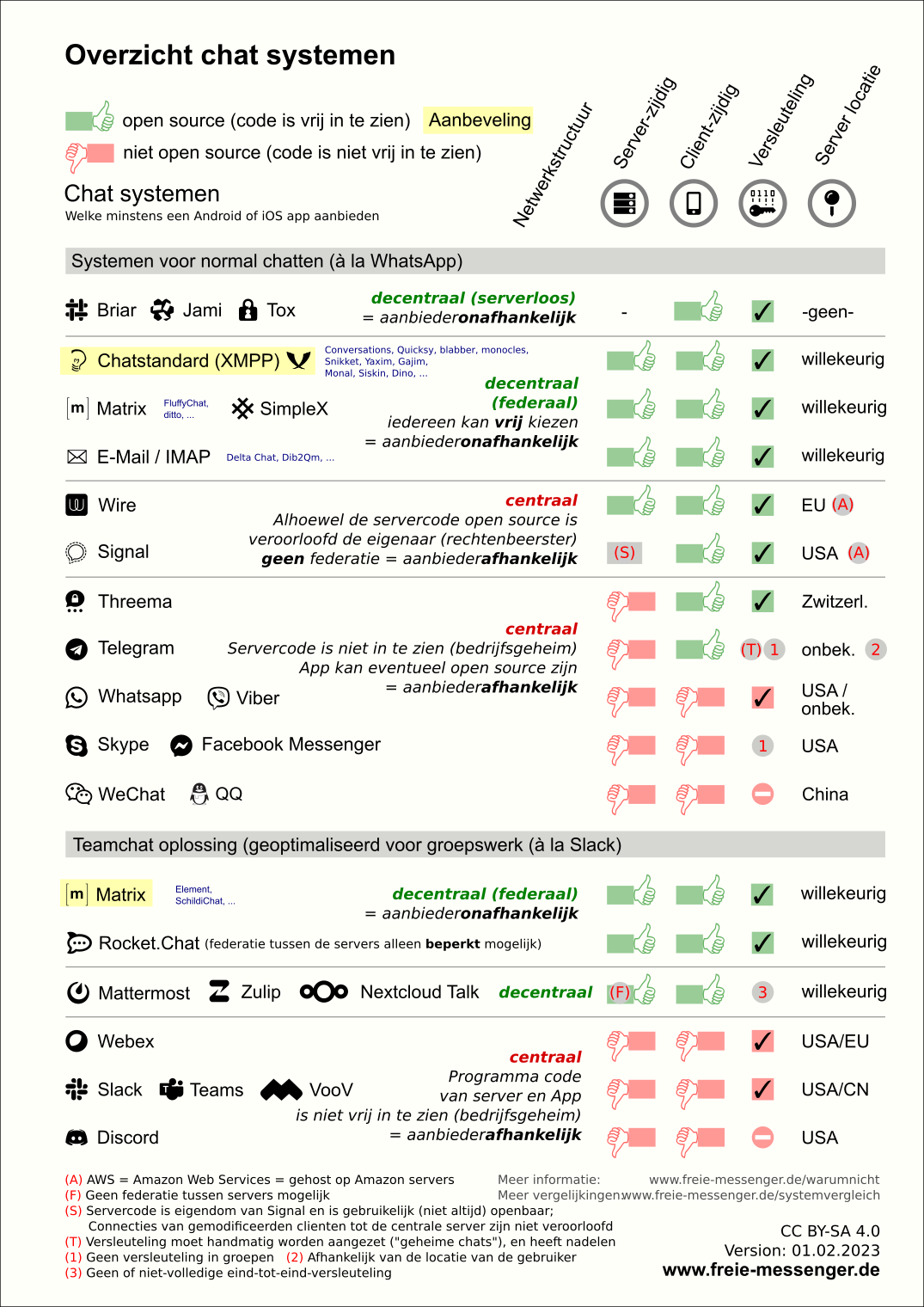 Dutch (PDF) Dutch (PDF)
| 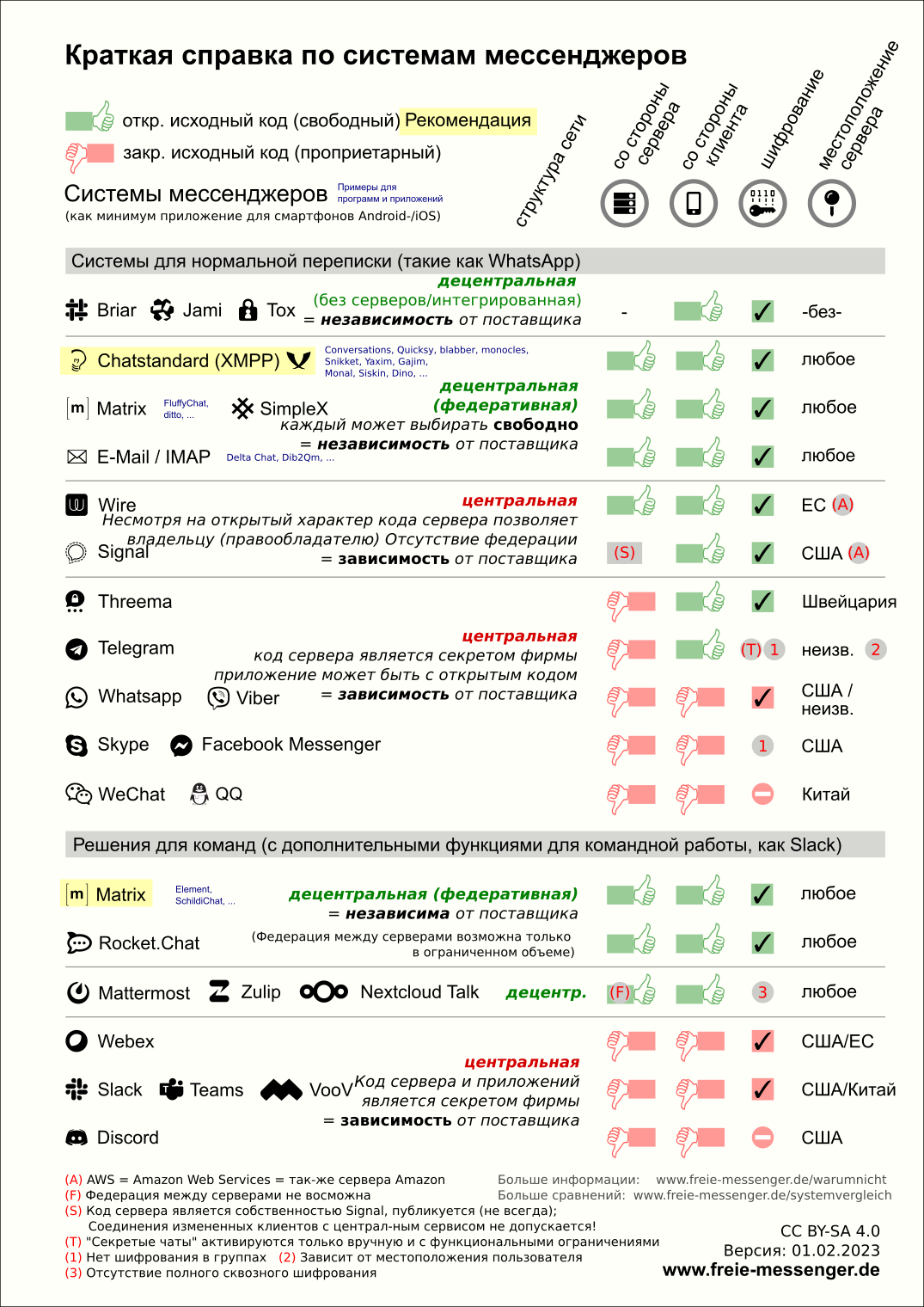 Russian (PDF) Russian (PDF)
| 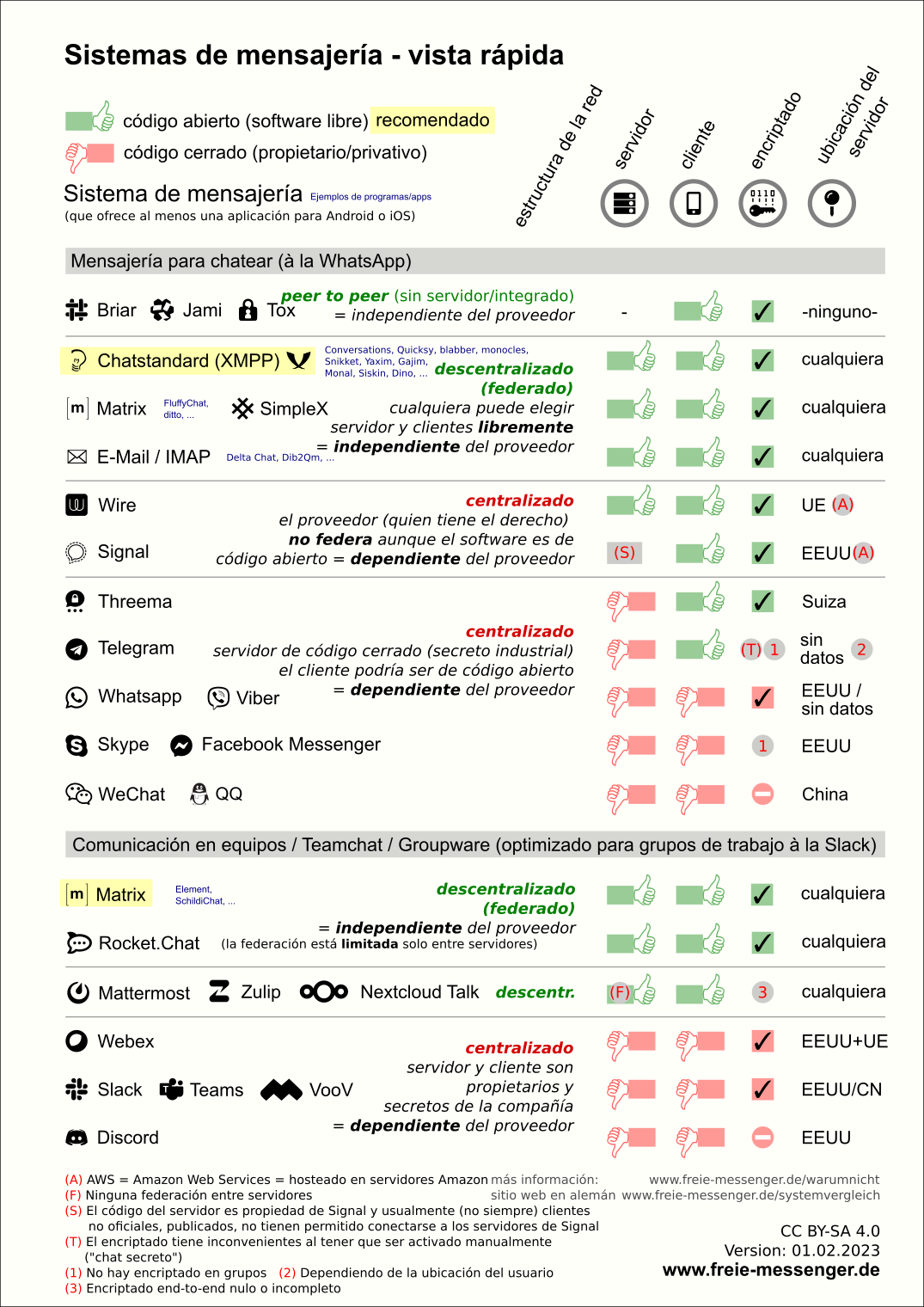 Spanish (PDF) Spanish (PDF)
| 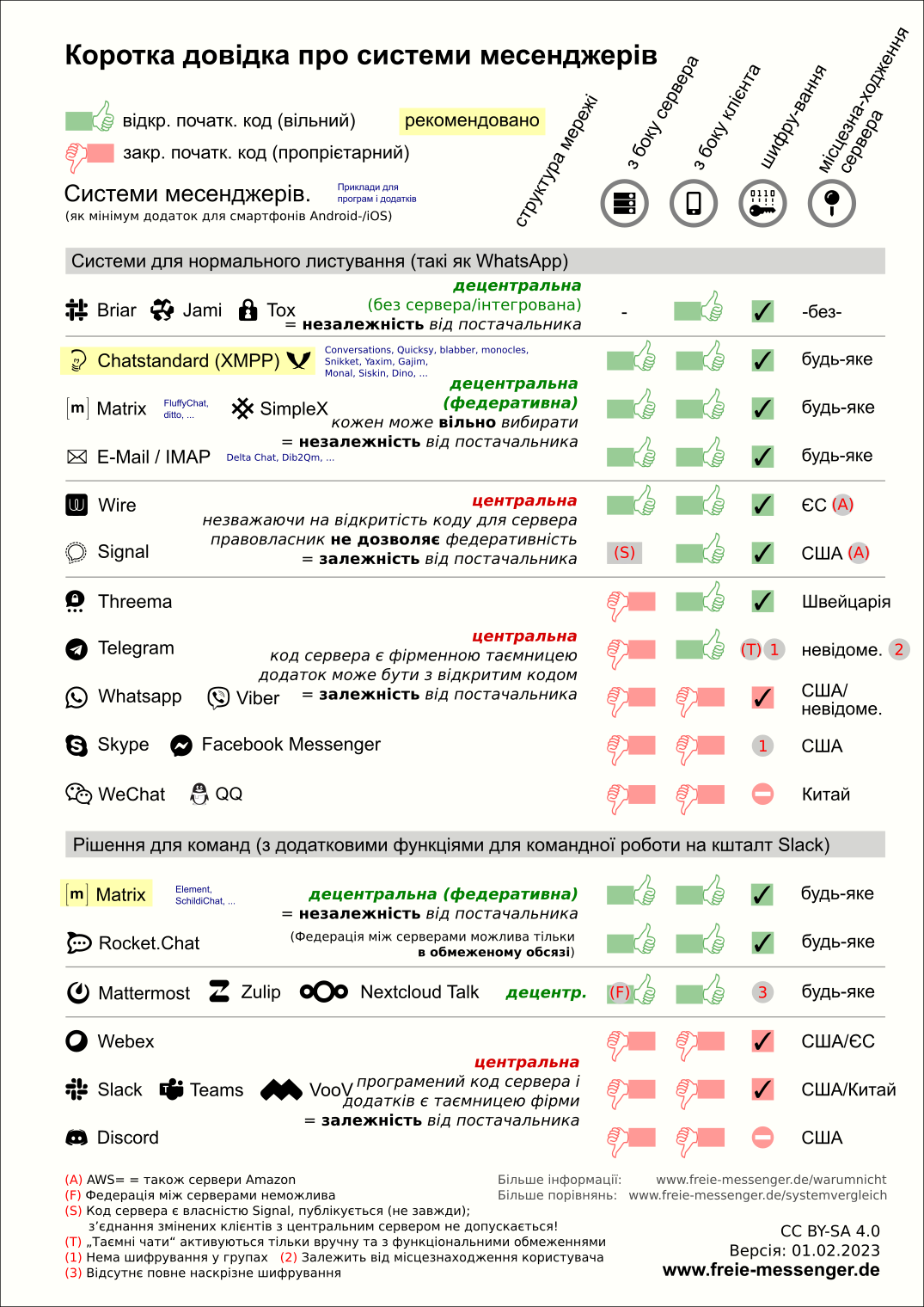 Ukrainian (PDF) Ukrainian (PDF)
|
Further Spanish information: https://niboe.info/whatsapp-telegram-signal-privacidad (external)
Time history
Messengers come and go. Here is a graphic showing when which messengers were introduced. The chat standard XMPP (Jabber) and Matrix were subsequently highlighted in color
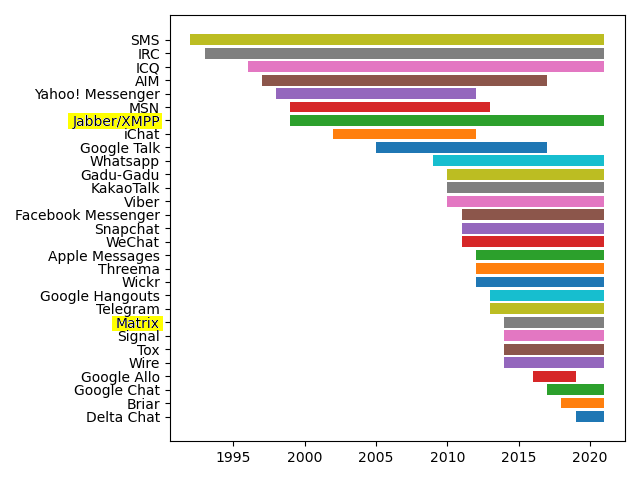
Source: https://mov.im/?blog/debacle%40movim.eu/76bf90a4-5f59-4962-92db-6cd859f42ec9
Comparison of WhatsApp with free, decentralized systems.
WhatsApp is by far the most popular messenger with the widest distribution in Europe. It has a great feature set, is easy to use and very convenient in terms of contact management. But …
| Suggestion and request: |
| There is no need to have only one messenger (usually WhatsApp) installed. In addition to the previously appreciated, central messenger (this can also be Signal, Threema, Telegram, etc.), a free messenger can also be used and at least offered as a contact option. |
There are major conceptual differences between the two vendor-independent systems Jabber (XMPP) and Matrix (Matrix protocol) - nevertheless they can be considered together in the following overview.
| Characteristics | WhatsApp (chatd/funXMPP) |
Chatstandard (XMPP) / Matrix (Matrix) |
E-Mail (IMAP) | Briar | |||||||||||
| Basics | |||||||||||||||
| Island system ("walled garden" [^1]) | yes | no | no | no | |||||||||||
| Free use (no "terms and conditions" | no time limit | yes | yes | yes | |||||||||||
| Open source code of messenger program(s) ("open source") - code can be reviewed | no | yes | yes | yes | |||||||||||
| Open source code of server program(s) ("open source") | no | yes | yes | no server | |||||||||||
| Public encryption protocol | no | yes | yes | yes | |||||||||||
| Free use | yes | yes | yes | Yes | |||||||||||
| Own messenger required for communication | yes | no | no | yes | |||||||||||
| General terms and conditions | yes | none | none | none | |||||||||||
| Minimum age for use | 16 | without | without | without | |||||||||||
| Registration and use | |||||||||||||||
| Multiple accounts possible | no | yes | yes | no | |||||||||||
| Anonymous name possible | no | yes | conditional [^2] | conditional [^3] | |||||||||||
| Can be used on several devices at the same time (multi-client synchronization) | no | yes | yes | no | |||||||||||
| Groups/conferences | |||||||||||||||
| Maximum number of participants in groups | 256 | unlimited | unlimited | unlimited | |||||||||||
| Authorizations in groups/conferences | few | various | no | various | |||||||||||
| - Owner | no | yes | all equal | no | |||||||||||
| - Administrator | yes | yes | all equal | yes | |||||||||||
| - Member | yes | yes | all equal | yes | |||||||||||
| - Participant/Reader | no | yes | no | no | |||||||||||
| Public rooms/groups | no | yes | no | no | |||||||||||
| Data protection/privacy | |||||||||||||||
| Independent of phone number | no | and | yes | yes | |||||||||||
| Central collection and evaluation of metadata | yes | no | no | no | |||||||||||
| Fully usable without address book synchronization | no | yes | yes | yes | |||||||||||
| Can be used on Android devices without a Google account | yes | yes | yes | yes | |||||||||||
| Can be used on Android without Google Cloud Messaging (GCM) | yes | yes | yes | yes | |||||||||||
| Online/offline status possible | yes | yes | no | no | |||||||||||
| Online/offline status can be switched off | yes | yes | no status | no status | |||||||||||
| Central recording of online/offline status | yes | no | no status | no status | |||||||||||
| Read and receipt confirmation can be switched off | partly | yes | Yes | Yes | |||||||||||
| Tip notification can be switched off | ? | yes | yes | yes | |||||||||||
| Security | |||||||||||||||
| End-to-end encryption ("e2e") | Yes | yes | yes | yes | |||||||||||
| "e2e" encryption in groups | Yes | yes | yes | yes | |||||||||||
| "e2e" encryption automatically/mandatorily activated | yes | yes [^4] | yes [^4] | yes | |||||||||||
| Technology | |||||||||||||||
| Infrastructure | centrally | decentralised | decentralized | decentralized | |||||||||||
| Choice between different messengers (client software) possible | no | yes | yes | yes | |||||||||||
| Storage location of contacts | central server | by server operator | on end device | on end device | |||||||||||
| Can be archived (e.g. for companies) | ? | yes | yes | no | |||||||||||
| Own server possible (e.g. for companies) | no | yes | yes | no | |||||||||||
| Other options | |||||||||||||||
| Financing model | Trade with data / advertising | XMPP: Donations Matrix: Investments | donations | donations | |||||||||||
| Special function "Telephone/video telephony" | yes | yes | no | no | |||||||||||
| Special "group call" function (encrypted) | no | no | no | no | |||||||||||
| Direct communication without Internet (LAN/WLAN/Bluetooth - p2p [^5]) | no | no | no | yes | |||||||||||
| Can be called up in the browser | yes | yes | yes | no | |||||||||||
| [^1]: Walled garden = Deliberately demarcated systems with which money is earned by offering free/cheap services that is generated in other areas | |||||||||||||||
| [^2]: Restriction: Anonymous e-mail accounts (without providing personal data) are rarely possible | |||||||||||||||
| [^3]: A direct contact knows the identity - From the perspective of other people | |||||||||||||||
| [^4]: e2e = end-to-end encryption is possible | |||||||||||||||
| [^5]: p2p = peer to peer = direct connection of the clients | |||||||||||||||
Table: Status 07/2022 (texts marked in blue = changes since 07/2020)_
The table can be downloaded as a print file: system comparison (PDF file)
To compare Jabber (XMPP) and Matrix (Matrix protocol): >> here <<
Of course there are also many other comparisons of messengers: >> here <<